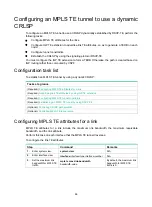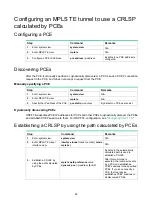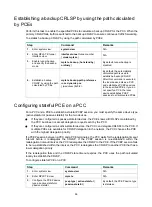
92
Step Command
Remarks
3.
Enable tunnel reoptimization.
mpls te reoptimization
[
frequency
seconds
]
By default, tunnel
reoptimization is disabled.
4.
Return to user view.
return
N/A
5.
(Optional.) Immediately
reoptimize all MPLS TE
tunnels that are enabled with
the tunnel reoptimization
feature.
mpls te reoptimization
N/A
Setting TE flooding thresholds and interval
When the bandwidth of an MPLS TE link changes, IGP floods the new bandwidth information, so the
ingress node can use CSPF to recalculate the path.
To prevent such recalculations from consuming too many resources, you can configure IGP to flood
only significant bandwidth changes by setting the following flooding thresholds:
•
Up
threshold
—When the percentage of the reservable-bandwidth increase to the maximum
reservable bandwidth reaches the threshold, IGP floods the TE information.
•
Down
threshold
—When the percentage of the reservable-bandwidth decrease to the
maximum reservable bandwidth reaches the threshold, IGP floods the TE information.
You can also set the flooding interval at which bandwidth changes that cannot trigger immediate
flooding are flooded.
This task can be performed on all nodes that the MPLS TE tunnel traverses.
To set TE flooding thresholds and the flooding interval:
Step Command
Remarks
1.
Enter system view.
system-view
N/A
2.
Enter interface view.
interface
interface-type
interface-number
N/A
3.
Set the up/down threshold.
mpls te bandwidth change
thresholds
{
down
|
up
}
percent
By default, the up/down threshold
is 10% of the link reservable
bandwidth.
4.
Return to system view.
quit
N/A
5.
Enter MPLS TE view.
mpls te
N/A
6.
Set the flooding interval.
link-management
periodic-flooding timer
interval
By default, the flooding interval is
180 seconds.
Controlling MPLS TE tunnel setup
Before performing the configuration tasks in this section, be aware of each configuration objective
and its impact on your device.
Perform the tasks in this section on the ingress node of the MPLS TE tunnel.
Enabling route and label recording
Perform this task to record the nodes that an MPLS TE tunnel traverses and the label assigned by
each node. The recorded information helps you know about the path used by the MPLS TE tunnel
and the label distribution information, and when the tunnel fails, it helps you locate the fault.
To enable route and label recording:
















































